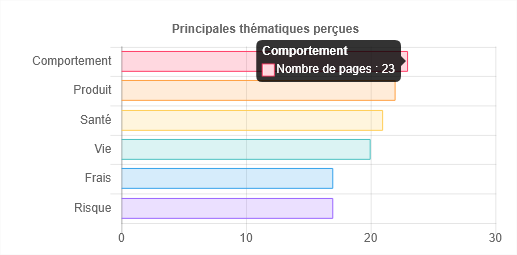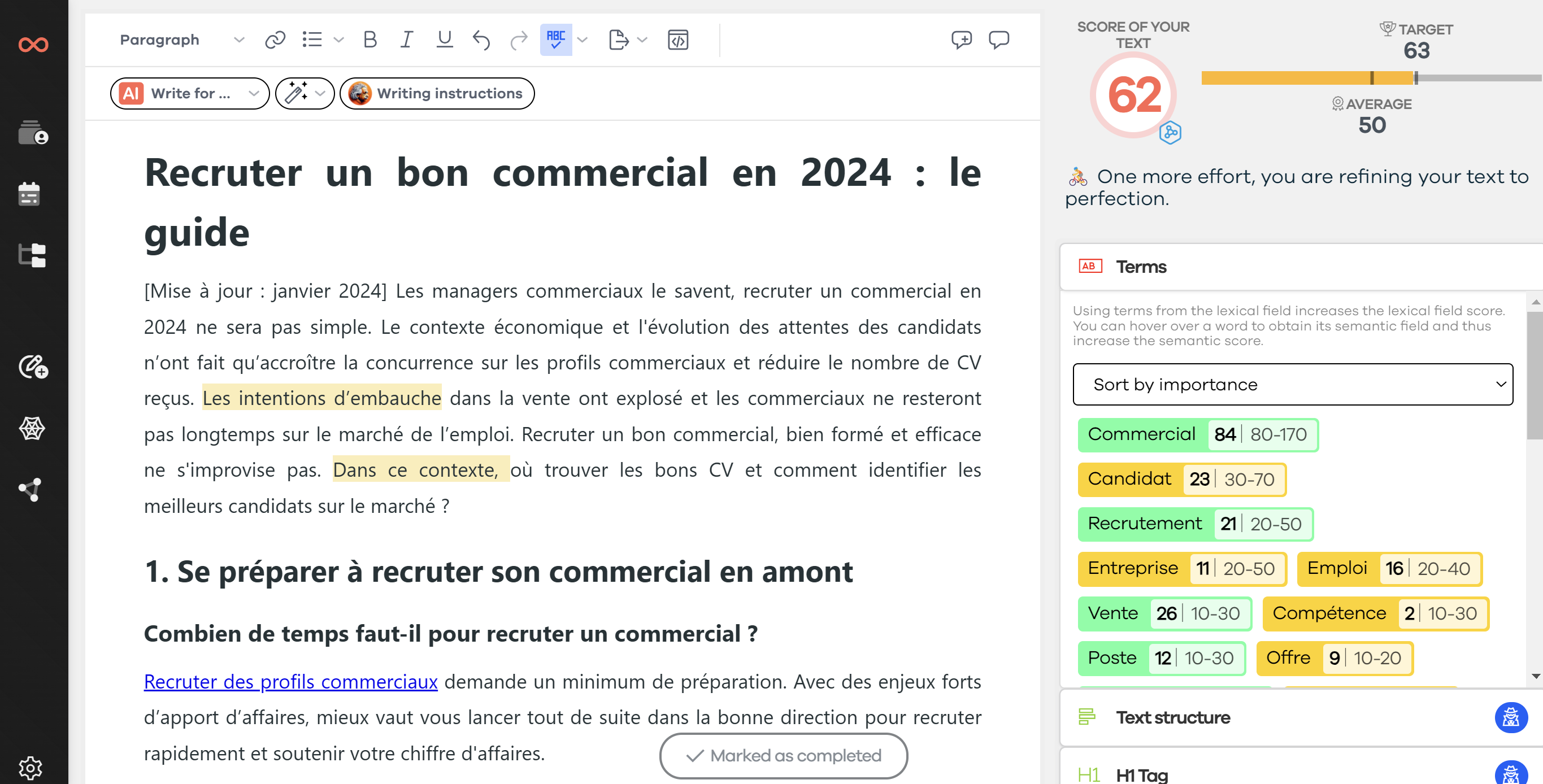Of course, you know that you need to create links to improve the authority of your website. In addition, you must carefully work on the navigation within your website and add links pointing to other pages on your site. But did you know that, if you want good results, these optimizations must be done in a strategic and relevant way?
Indeed, if your page deals with underwater photography and the incoming links come from topics such as automobiles or gastronomy, then it will not be as effective as if they came from articles talking about diving or photography. Hence the importance of thematic relevance in SEO!
SEO aims to improve certain aspects of the content strategy in order to increase organic traffic. Since the Hummingbird algorithm update, keywords are less taken into account by Google, while semantic search algorithms and link relevance are more important than ever. The thematic relevance of links is now one of the most important elements of the link building strategy or the internal linking strategy.
I usually tell my clients that an external or internal link remains a link in the eyes of Google. Think about it!
🚀 Express reading: summary of what you will learn by reading this article
In this article, you will discover everything you need to know about thematic relevance in SEO, including:
- its definition: a score used by search engines to determine the quality of a web page's incoming links;
- its importance: this criterion is taken into account by website indexing algorithms;
- its calculation: even though the measurement is extremely complex, we explain the basics so you can understand the principle;
- website optimization tips: four steps are important, two of which are absolutely crucial;
- a tip for improving your internal link anchors.
🔎 What is thematic relevance?
Thematic relevance is a score used by search engines to measure the relevance of a web page based on the quality of the topics of its links. In summary, thematic relevance allows measuring the relevance of the links used by a website.
Websites are constantly ranked by search engines. To do this, they use more than 200 SEO factors! Some of these factors are more important than others. Thematic relevance is one of these criteria. It focuses on obtaining and optimizing links. These links must point to relevant pages that share the same theme.
PageRank is the algorithm used by Google to assign a score to pages and websites. The higher the number of links pointing to a website, the more authoritative it will be considered, and the more valuable the links from this domain will be. This algorithm revolutionized SEO, and most search engines use their own modified version of PageRank.
Thematic PageRank (topic sensitive PageRank in English) is an algorithm that adds thematic relevance and topical authority to the original PageRank algorithm.[1] It analyzes the relevant topics of each indexed page and, when a user enters a search query, it determines which topics match. This allows it to offer thematically relevant results.
❓ Why is thematic relevance important?
Keywords can be influenced, and users sometimes use slight variations when conducting searches. That's why, today, search engines take less account of search terms and try to understand the meaning beyond words and the search intent. In other words, the context of the search is very important.
Thanks to these new models and methods for indexing themes, links, and pages (cf. the reasonable surfer patent), Google considers the relevance of a link based on its position on the page, its context, and the related topics present on its source and target pages.[2]
Since thematic relevance is taken into account by Google's algorithms, it is difficult to deceive search engines. Tricking the algorithms takes a lot of effort, and today it is easier to become a true authority in a specific domain than in a set of domains.
Without thematic relevance, search engines can easily be fooled. "Black hat" techniques were, for a long time, very easy to execute, as all pages had more or less the same value. It was easy to create a constellation of websites for the sole purpose of obtaining links.
With thematic relevance, not only must your site be authoritative on its theme, but your links must also come from websites with a similar theme. Since thematic relevance works like a domino effect, the links published by these sites must, in turn, come from relevant sources, and so on.
A theme can be defined as an abstract concept expressed through the use of literal terms (key phrases and keywords). Themes tend to evolve over time and the keywords associated with them change constantly. As thematic relevance is constantly evolving, it is important to ensure the relevance of your links.
🧮 How is thematic relevance calculated?
Thematic relevance is not easy to calculate due to the numerous parameters that make it up. However, SEOQuantum, through its semantic audit tool, has taken up the challenge.
Let's review the main steps performed by the algorithms (and especially our audit tool) that calculate it:
- Crawl: extraction of raw content from a web page.
- Analysis of the publication body: identification of the main part of the web page.
- Keyword extraction: creation of the list of keywords found in the publication body.
- Theme extraction: creation of the list of topics appearing in the publication body.
- Ranking: assigning a score to each topic.
The concept of thematic relevance is much more complex!
To evaluate it, an algorithm must take into account incoming links and the thematic relevance of each source (source page and source domain). Anchor texts and the context of the link play an important role in assessing the value of each link. Top of Form
⚙️ SEO optimization of your website's theme
Here are some tips for improving the thematic relevance of your pages:
- Publish detailed content with the subject covered exhaustively (discover what quality content is in SEO).
- Link your pages in a relevant way (learn more about internal linking).
- Obtain natural links (websites must be related to your topic) (here are 17 tips for finding backlinks!).
- Receive social signals from authoritative sites (only the implementation of the previous factors will allow you to achieve this...).
SEO strategies have changed little since the introduction of thematic relevance. Continue doing what you are already doing while keeping the concept of thematic relevance in mind. Persevere in obtaining links and social signals, continue writing quality publications while ensuring that they are well linked to your topic.
Prioritize quality and do not hesitate to reduce the number of links, shares, and publications to focus on a well-defined subject. Optimizing your SEO strategy based on the topic cluster will be, in the long run, inevitable. No magic tactic or trick will allow you to be among the top results without effort.
Choose a subject that is not too broad, for each article
In order to improve the SEO of pages through thematic relevance, the webmaster or SEO consultant must focus on the overall topic optimization strategy. Remember: keywords should not be your main goal, but topics should be.
To achieve this, you must create semantic silos and write numerous content pieces around your content pillar. Each blog covers several topics (the main topics of the brand) through publications and keywords.
It is advisable to focus on a theme and cover it exhaustively through one or more publications.

Here is an example of "perceived themes" extracted from SEOQuantum's semantic crawler for a site on dog training. Here, the tool identified 23 pages with the theme of behavior.
For information, this site is ranked in the TOP 3 for more than 350 keywords related to behavior and more than 650 in the TOP 10.
Create relevant and thematic links to other content
Each link has a transferable value of importance and theme. This is the famous link juice in natural SEO. Thematic internal linking allows Google and other search engines to better understand the subject of a page through thematic links.
Instead of designing standalone pages without internal links, write publications that will guide users (and Google) to other pages in order to extend your reader's learning experience.
Keep in mind that Google wants to highlight "niche leader" pages or websites. With good thematic internal linking, you show that you cover a theme from different angles and that your level of expertise is excellent.

Here is an example of internal linking optimizations extracted from SEOQuantum's semantic crawler. Here, the tool suggests creating links from the page to the "pages to link".
This model works on machine learning, the AI interprets the concepts of each page. The proximity calculation is not only based on a simple combination between the frequency of terms on the pages (as some tools propose).
⚓ Optimize the internal link profile
While most SEO experts have tried to define the perfect anchor text, know that no one has succeeded yet. However, a Google patent called phrase-based indexing provides us with many tips on anchor texts.[3]
Be aware that there is no penalty (to date) for optimized internal anchor texts.
Focus on these famous anchor texts. In your internal linking, use exact versions of your keywords, as well as variations. For better results, ensure that your anchors comply with the content of the destination page.
Do not forget to examine your subject from all angles. According to the reasonable surfer model, links should be in the part of the text ("in text") that corresponds to them the most. This can be a sentence or an entire paragraph.

Here is an example of an internal link profile analysis extracted from SEOQuantum's semantic crawler.
It is not enough to optimize your texts around a main keyword to improve your position in the SERP! To please your users and appeal to Google, you must demonstrate your expertise! If with each publication you cover a different subject and your baker friend has linked to your travel blog, then you simply won't make it!
If you want to succeed in SEO, you want to demonstrate the thematic relevance of your website. To do this, you not only write high-value content but also link each page to other related topics and receive backlinks mainly from authoritative sites dealing with the same subject.
It's up to you! Use the SEOQuantum tool to analyze the thematic relevance of your site and optimize it accordingly! You will then be able to significantly improve your internal linking and then seek to receive quality backlinks. And remember, don't mix everything up! Each link pointing to a page must be revealing according to its theme!
🙏 Sources used to write this article
[1] http://www-cs-students.stanford.edu/~taherh/papers/topic-sensitive-pagerank.pdf
Need to go further?
If you need to delve deeper into the topic, the editorial team recommends the following 5 contents:

